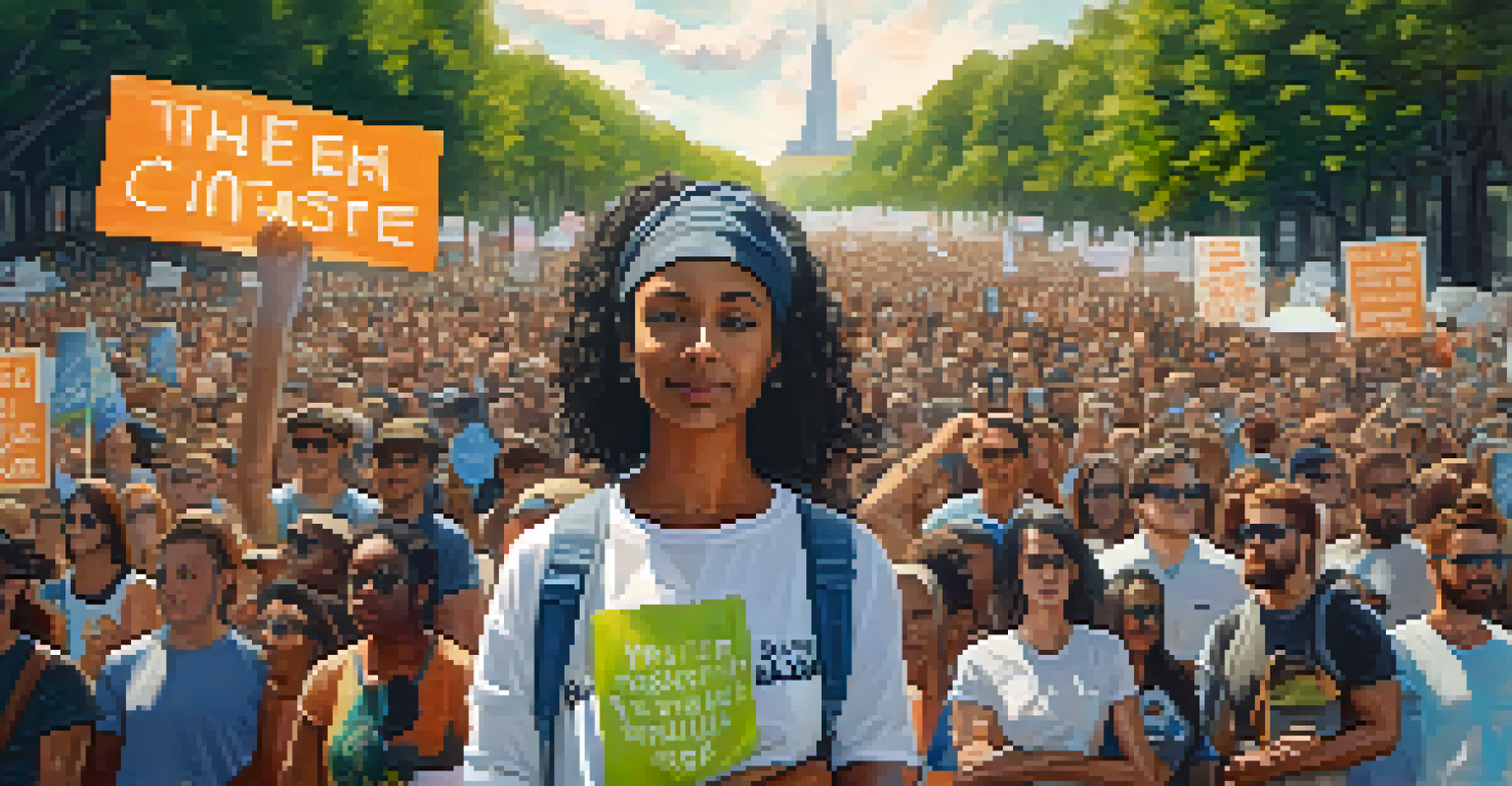Hollywood’s Role in Climate Change Conversations

Hollywood's Influence on Public Perception of Climate Change
Hollywood has a unique ability to shape public perception, often bringing critical issues to the forefront of social discussions. Through compelling storytelling and visuals, films and documentaries can make complex topics like climate change relatable and urgent. For instance, movies like 'An Inconvenient Truth' not only educated audiences about global warming but also inspired a generation to care about environmental issues.
The greatest threat to our planet is the belief that someone else will save it.
Celebrities also play a significant role in this influence, using their platforms to amplify messages about climate action. When a popular actor or musician speaks out about the environment, it can reach millions, often sparking conversations in households that might otherwise overlook these topics. This kind of visibility is crucial for raising awareness and motivating action at a grassroots level.
Moreover, Hollywood's portrayal of climate change often highlights the emotional aspect of environmental degradation. These narratives can evoke empathy and a sense of urgency, encouraging audiences to reflect on their own lifestyles and the impact they have on the planet.
Documentaries: A Powerful Tool for Climate Advocacy
Documentaries serve as a vital medium for educating the public about climate change, often providing in-depth analyses and alarming statistics. Films like 'Chasing Ice' and 'Our Planet' not only showcase the beauty of nature but also depict the harsh realities of its decline due to human actions. Through stunning visuals and expert interviews, these documentaries can stir emotions and provoke thought.

These films often highlight the voices of scientists and activists who are working tirelessly to combat climate change. By putting a human face on these issues, documentaries can bridge the gap between complex scientific data and everyday understanding. This approach makes the conversation more accessible and encourages viewers to engage with the topic meaningfully.
Hollywood Shapes Climate Awareness
Through impactful storytelling, films and celebrities significantly influence public perception and discussions about climate change.
Furthermore, the success of climate-focused documentaries can lead to tangible outcomes, such as increased funding for environmental initiatives or a shift in public policy. The combination of storytelling and factual evidence can galvanize audiences to not only watch but also act, fostering a culture of environmental responsibility.
Celebrities and Their Role as Climate Change Advocates
Celebrities have the power to sway public opinion, and many have taken on the mantle of climate change advocacy. Figures like Leonardo DiCaprio and Jane Fonda have not only used their fame to raise awareness but have also actively participated in environmental campaigns. Their involvement often brings significant media attention, creating a ripple effect that can influence broader societal attitudes towards climate issues.
We do not inherit the earth from our ancestors, we borrow it from our children.
By sharing personal stories about their own journeys towards sustainability, these public figures can inspire fans to follow suit. When a beloved celebrity promotes eco-friendly practices, it can resonate deeply with audiences, encouraging them to consider their own choices. This relatable approach often makes the message more impactful and actionable.
Moreover, celebrities can leverage their platforms to initiate fundraising efforts for climate-related causes. By organizing events or partnering with organizations, they can mobilize resources that support critical environmental initiatives, showcasing the potential of collective action in the fight against climate change.
The Impact of Climate Change Films on Policy and Action
Films centered around climate change have the ability to influence policy discussions by raising awareness among both the public and lawmakers. When a film gains traction and sparks conversation, it can put pressure on political leaders to address environmental issues. This dynamic illustrates how storytelling can translate into action, emphasizing the interconnectedness of media and policy.
Additionally, successful climate documentaries often lead to increased funding for research and initiatives aimed at combating climate change. When viewers are moved by what they see, they are more likely to support proposals for sustainable practices and technologies. This not only impacts public sentiment but can also lead to legislative changes.
Documentaries Drive Climate Action
Powerful documentaries educate audiences about climate change, often leading to increased funding and grassroots movements for environmental initiatives.
The ripple effect of these films can also inspire grassroots movements, further amplifying calls for action. When communities rally around a shared message, it can create a strong foundation for meaningful change, demonstrating how the arts can play a pivotal role in environmental advocacy.
The Role of Social Media in Climate Change Messaging
Social media has become a powerful tool for spreading climate change awareness, with platforms allowing for real-time sharing of information and ideas. Celebrities and filmmakers alike utilize Instagram, Twitter, and TikTok to engage directly with their audiences, making the conversation more interactive and immediate. These platforms enable a two-way dialogue, allowing viewers to share their thoughts and experiences related to climate change.
Viral campaigns often emerge from social media, encouraging collective action among users. Hashtags like #FridaysForFuture or #ClimateStrike have mobilized millions, showcasing the potential for online movements to influence real-world change. This digital activism complements the narratives shared in films, reinforcing messages and encouraging participation.
Moreover, social media offers a space for diverse voices, including those from marginalized communities disproportionately affected by climate change. By amplifying these perspectives, the conversation becomes more inclusive, encouraging broader participation in climate activism and fostering a sense of global solidarity.
Challenges Hollywood Faces in Climate Change Advocacy
Despite its influence, Hollywood faces several challenges in effectively addressing climate change. One significant hurdle is the industry's own carbon footprint, stemming from film production and distribution processes. Many filmmakers are aware of the irony in promoting eco-consciousness while contributing to environmental degradation and are actively seeking solutions.
Additionally, the entertainment industry often grapples with the balance between entertainment and education. While engaging narratives are crucial for drawing audiences in, there's a fine line between sensationalism and factual representation. Striking this balance is essential to ensure that the messages conveyed are both impactful and grounded in reality.
Social Media Amplifies Climate Voices
Platforms like Instagram and Twitter facilitate real-time climate change discussions, mobilizing collective action and amplifying diverse perspectives.
Lastly, the fast-paced nature of news cycles can overshadow important climate issues. With so many competing stories vying for attention, it can be challenging for climate change conversations to maintain momentum. Hollywood must continue to find innovative ways to keep these discussions alive and relevant.
Future Directions for Hollywood in Climate Change Messaging
Looking ahead, Hollywood has the opportunity to redefine its role in climate change discourse. By embracing sustainability in production practices, the industry can set a powerful example and inspire others to follow suit. Initiatives like reducing waste, using renewable energy, and promoting electric vehicles on set can demonstrate a commitment to environmental responsibility.
Moreover, collaborative efforts between filmmakers, scientists, and activists can enhance the credibility and impact of climate narratives. By incorporating accurate scientific data into storytelling, Hollywood can bridge the gap between entertainment and education, fostering a deeper understanding of climate issues among audiences.

Finally, as technology continues to evolve, so too can the methods of storytelling. Virtual reality experiences and interactive documentaries could provide immersive ways for audiences to engage with climate change, making the issue feel more immediate and personal. By leveraging innovation, Hollywood can maintain its relevance in the climate change conversation and inspire action for a sustainable future.